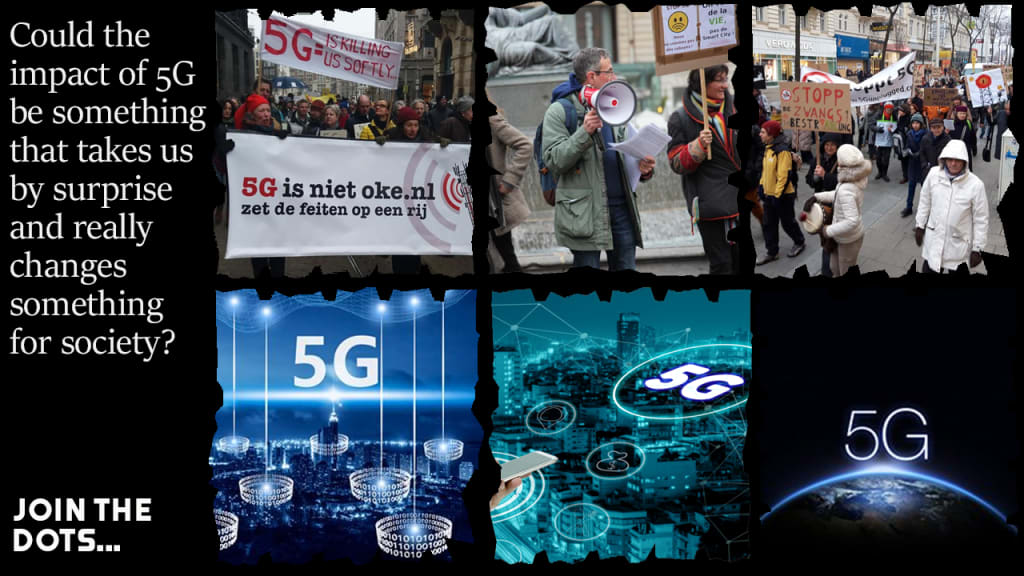'Covid' Ops: Protest and the drive for 5G
A lock-down to bypass free speech?

Once again, until the earth stood still I had very little interest or knowledge about 5G, but with all the doomsday talk I thought it important to try to find out what all the fuss is about. So, here we go, 5G in a nutshell, according to how I see it.
5G networks are perceived as the next generation of mobile internet connectivity, able to provide faster speeds and more reliable connections on smartphones and other devices than ever before.
Combining cutting-edge network technology and the latest high-spec devices, 5G should offer connections that are far faster than previous mobile technology, with average download speeds of around 1Gbps expected to soon be the norm.
The networks are expected to supercharge “Internet of Things” technology, providing the infrastructure needed to carry huge amounts of data to allow for a smarter and more connected world.
5G networks have launched around the world with providers offering the technology across the US, UK and Australia, as well as a variety of other countries around the globe.
OK, first observation… 5G will allow the transmission of vastly more information at much faster speeds, which will make it far easier to connect people and offer hugely improved entertainment packages. Fair enough, that gets a thumbs up from me.
But on the converse, such technology increases the scope of security and surveillance measures the intelligence services are able to call on. In the hands of a state where humanity is valued I don’t see this as a bad thing, but in the wrong hands it could hugely strip away our freedoms. So in my eyes, the jury is out on this aspect.
In the UK, 2019 was an expansive period for the technology, with it reaching cities and towns but not blanketing the majority of the country.
EE was the first UK carrier to launch its 5G network, switching it on in six cities on 30 May 2019. By the end of 2019, it had expanded to 50 towns and cities from London to Edinburgh, including Birmingham, Belfast, Manchester, Liverpool, Leeds, Glasgow and Wolverhampton. By April 2020, coverage was available in 71 towns and cities.
EE, formerly Everything Everywhere, is a division of the BT Group and as of 2019 the largest mobile network operator in the UK, with around 32 million customers.
BT launched its mobile virtual network operator (MVNO) in October 2019 and since it uses EE's 5G network, the former's coverage extends wherever the latter's goes.
Vodafone launched its 5G service on 3 July 2019 in seven cities, rolling it out to a further eight towns and cities on 17 July. By year's end, that had expanded to 31 cities and towns, including London, Glasgow, Birmingham and Cardiff. As of April 2020, Vodafone offers 5G in 41 places. It also offers 5G roaming in select locations, which the other major UK networks don't.
Next up was Three, which launched a 5G service in London on 19 August, though initially only for home broadband. The carrier's planned late 2019 mobile 5G roll-out was pushed back to early this year to ensure all elements of the network were built out.
It has now launched, with 5G offered in parts of 66 locations as of April 2020. It also offers 5G as standard on all its plans, which not all networks do, and it sells a similar selection of 5G handsets.
O2 finally rolled out its 5G service in October 2019 in London, Cardiff, Edinburgh, Belfast, Leeds and Slough. The carrier planned to expand 5G to 14 additional cities by year's end, including Bristol, Eton, Leicester, Nottingham and Windsor. As of April 2020 if offers 5G in 24 locations, and by summer 2020 the carrier hopes to grow this to 50 cities and towns.
Sky Mobile has now launched at the start of 2020 (after a couple of months of delay past the original November 2019 launch date) offering services in a variety of cities. It uses O2's infrastructure, so should match that network's coverage.
Tesco Mobile switched 5G on in March 2020, offering coverage in the same places as O2, while VOXI launched in October 2019, with coverage in the same places as Vodafone.
On this point, I’ve been struggling to understand the purpose of all this mind control to keep us locked indoors indefinitely and prevent us from enjoying open spaces. My question, could this be to rapidly expand 5G from just the towns and cities to open areas as well, without the protests of those who perceive the technology as dangerous to public health?
If, as I believe, we are heading down the road to a Chinese-style social credit system, then nationwide 5G coverage is an absolute necessity. The Chinese government has no problem introducing this... in the rest of the world it is a whole different ball game.
At the moment we enjoy free speech and the right to challenge things we oppose, with the implementation of 5G one subject of great concern to many.
Last year’s Extinction Rebellion protests and scenes in Hong Kong and elsewhere in the world must have put the fear of God into some of our politicians… are these ridiculous measures a way to keep the world clear of people to introduce this without massive protests?
And finally to the big question, is 5G safe?
Although it may improve our day to day lives, many groups have voiced concern about potential health hazards, with many of these concerns over 5G's use of the higher energy millimeter-wave radiation.
"There's often confusion between ionizing and non-ionizing radiation because the term radiation is used for both," says Kenneth Foster, a professor of bioengineering at Pennsylvania State University. "All light is radiation because it is simply energy moving through space. It's ionizing radiation that is dangerous because it can break chemical bonds."
Ionizing radiation is the reason we wear sunscreen outside because short-wavelength ultraviolet light from the sky has enough energy to knock electrons from their atoms, damaging skin cells and DNA. Millimeter waves, on the other hand, are non-ionizing because they have longer wavelengths and not enough energy to damage cells directly.
"The only established hazard of non-ionizing radiation is too much heating," adds Foster, who has studied the health effects of radio waves for nearly 50 years." At high-exposure levels, radio frequency (RF) energy can indeed be hazardous, producing burns or other thermal damage, but these exposures are typically incurred only in occupational settings near high-powered radio frequency transmitters, or sometimes in medical procedures gone awry."
Many of the public's outcries over the adoption of 5G echo concerns over previous generations of cellular technology. Skeptics believe exposure to non-ionizing radiation may still be responsible for a range of illnesses, from brain tumours to chronic headaches. Over the years, there have been thousands of studies investigating these concerns.
In 2018, the US National Toxicology Program released a decade-long study that found some evidence of an increase in brain and adrenal gland tumours in male rats exposed to the RF radiation emitted by 2G and 3G cellphones, but not in mice or female rats. The animals were exposed to levels of radiation four times higher than the maximum level permitted for human exposure.
Although Foster disagrees with many of the conclusions skeptics have about previous generations of cellular networks, he agrees that we need more studies on the potential health effects of 5G networks.
"Everyone I know, including me, is recommending more research on 5G because there's not a lot of toxicology studies with this technology," Foster goes on. But for the proponents of 5G, many believe the benefits it can provide to society far outweigh the unknowns.
"I think 5G will have a transformational impact on our lives and enable fundamentally new things," says Harish Krishnaswamy, an associate professor of electrical engineering at Columbia University in New York. "What those types of applications will be and what that impact is, we can't say for sure right now. It could be something that takes us by surprise and really changes something for society. If history has taught us anything, then 5G will be another example of what wireless can do for us."
But those protesting against 5G see it as a massive biological experiment inflicted on the public without informed consent, with no prior safety testing, and with credible scientific evidence indicating this technology will prove harmful to health and fatal to some.
The website Stop5Ginternational points out that: “Numerous recent scientific publications have shown that EMF affects living organisms at levels well below most international and national guidelines. Effects include increased cancer risk, cellular stress, increase in harmful free radicals, genetic damages, structural and functional changes of the reproductive system, learning and memory deficits, neurological disorders, and negative impacts on general well-being in humans. Damage goes well beyond the human race, as there is growing evidence of harmful effects to both plant and animal life.”
Disseminating all the perceived threats of 5G would require a huge amount of further research on my part, but that’s not relevant, what is relevant is that there is extensive opposition to 5G and a lot of negativity about its implementation.
So, I ask again, could these restrictions be about rolling this out in a way that stifles protest?
The home page of the Stop5Ginternational website notifies us of the next instalment of the global protest to stop 5G, which had been scheduled for 25 April. I’m guessing the “Covid” conspiracy has put paid to that!
About the Creator
Steve Harrison
From Covid to the Ukraine and Gaza... nothing is as it seems in the world. Don't just accept the mainstream brainwashing, open your eyes to the bigger picture at the heart of these globalist agendas.
JOIN THE DOTS: http://wildaboutit.com






Comments
There are no comments for this story
Be the first to respond and start the conversation.